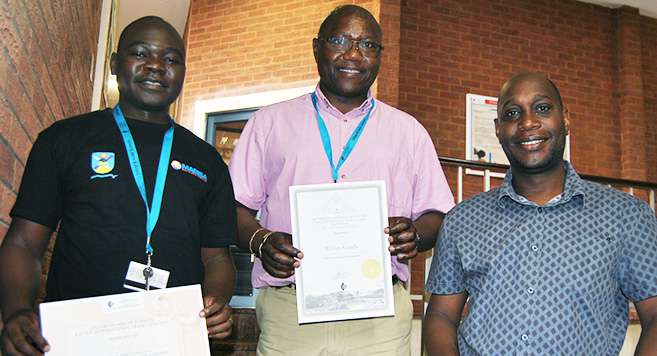UKZN scoops first prize at parasitology conference
October 21st, 2015
UKZN postdoctoral student, Dr Owen Rubaba, and PhD student, Mr Resign Gunda, won first prizes at the 44th Parasitological Society of Southern Africa (PARSA) Conference for their research presentations.
Rubaba’s poster titled: “Field Studies on Aestivation in Umkhanyakude District of South Africa”, showed results of a study carried out in the Umkhanyakude District, into the behaviour and survival strategies of schistosomiasis transmitting snails during adverse conditions.
Gunda’s oral presentation was titled: “The Economic Burden of Malaria on Rural Households in Gwanda District, Zimbabwe”. Gunda recently won first prize for the same presentation at the College of Health Sciences Research Symposium.
‘Receiving these prizes was such a boost for my academic journey,’ said Gunda. ‘I am grateful to my supervisors Professor Moses Chimbari and Professor Samson Mukaratirwa for their mentorship and guidance.’
Rubaba said the win was unexpected since all the posters presented were of good quality, ‘I feel humbled and happy that our work is being recognised by research peers.
Both the studies are part of a bigger project, Malaria and Bilharzia in Southern Africa (MABISA), which involves different communities and other stakeholders. MABISA is an interdisciplinary project that looks at the impact of climate change on bilharzia and malaria and is being carried out in Zimbabwe, Botswana and South Africa.
Malaria is a serious public health problem in sub-Saharan Africa and is a leading cause of morbidity and mortality. ‘Malaria imposes an economic burden on rural households in poorly resourced and vulnerable communities. Our study assesses these costs and their burden on the poor,’ said Rubaba.
Rubaba joined CHS Research Dean Chimbari’s team in December 2013. Since then he has been attached to the MABISA project where in addition to supporting postgraduate students he spearheads work on intermediate host snails for schistosomiasis
Chimbari said Rubaba’s work on snail aestivation was very topical in the 1960s and 1970s but got neglected when there was a shift from snail based schistosomiasis control to one largely focused on treatment of infected people.
‘However, the work is now generating much interest as it helps to understand the influence of climate change in re-shaping schistosomiasis transmission,’ said Chimbari.
Rubaba said the study was well received by the community. ‘It generated a lot of awareness on bilharzia transmission, prevention and control. We were able to describe the host snail ecology and discovered that the snails preferred weed cover to burrowing under the soil. The snails actually do not have great ability to burrow deep into the soil, however if they get under the soil due to animal foot pressure or natural soil movements under the water, the snails’ survival chances increased.’
He said reduction of weed cover would reduce snail shelter and food. ‘An understanding of snail ecology would increase awareness of schistosomiasis potential in the area. There would also be increased knowledge on control and preventative measures.’
Zimbabwean-born, Rubaba is currently setting up a laboratory experiment mimicking the natural conditions to better understand snail ecology under adverse conditions. He plans to study the physiology of the snails during aestivation period.
Gunda joined Chimbari’s research team in 2013 when he registered for PhD studies. According to Chimbari, Gunda has already produced three manuscripts from his research work and is scheduled to complete his studies in 2016.
‘His two awards are a clear indication that his work is of high standard and that he presents it in a confident manner. Gunda is a potential winner of the highly contested lead publisher MABISA students competition. The award will be given to the student that has more publications than others before the end of the year and the prize will be funding to attend an international conference of the winner’s choice,’ Chimbari said.
Nombuso Dlamini
For the original version of this news item, please visit ndabaonline.ukzn.ac.za.

From left: Mr Resign Gunda, Prof. Moses Chimbari and Dr Owen Rubaba.
